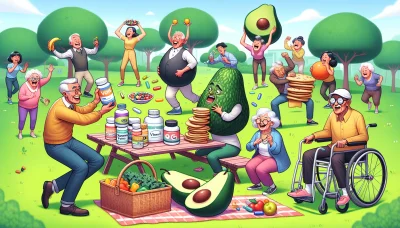Food cards for seniors Quiz
Test Your Knowledge
Question of
Understanding Food Cards for Seniors
What Are Food Cards?
Definition and Purpose
Food cards are prepaid cards that seniors can use to purchase groceries and food items. They are designed to provide nutritional assistance to older adults who may face financial difficulties or have limited access to healthy food options.
How They Differ from Food Stamps
Food cards differ from food stamps in that they are often issued by a variety of sources, not just governmental programs. They can come from nonprofit organizations, community groups, or specific food assistance programs tailored for seniors, providing more flexibility and sometimes covering a wider range of food items.
Eligibility Criteria for Seniors
Age and Income Requirements
To be eligible for food cards, seniors typically need to meet certain age and income requirements. The age requirement usually starts at 60 or 65, but it can vary depending on the program. Income requirements are often based on the federal poverty level, adjusted for household size and expenses.
How to Apply for Food Cards
Applying for food cards usually involves filling out an application with the issuing organization, which may require proof of age, income, and residency. The application process can often be initiated online, by mail, or in person at designated offices.
Types of Food Cards Available
Government-Issued Cards
Government-issued food cards are typically part of broader social service programs aimed at helping low-income individuals and families, including seniors. These cards can be used at participating grocery stores and markets to buy eligible food items.
Nonprofit and Community-Based Options
Nonprofit and community-based food cards are provided by organizations focused on fighting food insecurity among specific populations, including seniors. These cards may offer more flexibility in what can be purchased and where, sometimes including local farmers' markets and community food programs.
Benefits of Food Cards for Senior Nutrition
-
Access to Healthy Foods
- Importance of Nutrient-Dense Foods
- Overcoming Barriers to Healthy Eating
-
Budget Management for Seniors
- Stretching Fixed Incomes
- Planning and Shopping Strategies
-
Social and Emotional Advantages
- Community Engagement Opportunities
- Impact on Mental Health
Dietary Needs for Aging Adults
-
Nutritional Requirements for Seniors
- Essential Vitamins and Minerals
- Adjusting Caloric Intake with Age
-
Common Health Conditions and Diet
- Managing Diabetes with Diet
- Heart-Healthy Eating Habits
-
Hydration and Its Importance
- Recognizing Dehydration Risks
- Tips for Increasing Fluid Intake
Planning Senior-Friendly Meals with Food Cards
Creating Balanced Meal Plans
- Incorporating Variety and Balance
- Understanding Portion Sizes
Shopping Tips for Seniors Using Food Cards
- Finding Deals and Discounts
- Seasonal Shopping for Fresh Produce
Preparing Meals on a Budget
- Simple and Nutritious Recipes
- Time-Saving Cooking Techniques
Overcoming Dietary Restrictions and Allergies
Identifying Common Senior Dietary Restrictions
-
Lactose Intolerance and Alternatives
Many seniors develop lactose intolerance, which can limit their consumption of dairy products. Fortunately, there are numerous alternatives available, such as lactose-free milk, almond milk, and soy milk, which can help ensure they still receive the necessary nutrients without discomfort.
-
Gluten-Free Needs and Options
Gluten sensitivity or celiac disease requires a strict gluten-free diet. Seniors facing this restriction can explore a variety of gluten-free grains like quinoa, rice, and buckwheat. Many stores now offer gluten-free bread, pasta, and snack options as well.
Adapting Meals for Allergies and Intolerances
-
Safe Food Preparation Practices
To avoid cross-contamination, it's crucial to use separate utensils and cookware when preparing allergen-free meals. Regular cleaning of surfaces and thorough washing of hands are also essential to prevent any allergic reactions.
-
Reading Labels for Hidden Allergens
It's important to read food labels carefully to identify any hidden allergens. Many products may contain traces of nuts, dairy, or gluten, even if they are not primary ingredients. Understanding labeling laws and symbols can help in selecting safe foods for those with allergies and intolerances.
Enjoying a Varied Diet Within Restrictions
-
Exploring New Cuisines and Ingredients
Dietary restrictions don't have to limit the enjoyment of food. Exploring new cuisines and ingredients can open up a world of flavors and dishes that comply with dietary needs. Many ethnic cuisines offer naturally gluten-free or dairy-free options that are both nutritious and delicious.
-
Maintaining Nutritional Balance
Ensuring a balanced diet is crucial, especially for seniors with dietary restrictions. Incorporating a variety of fruits, vegetables, lean proteins, and whole grains can help maintain health and energy levels. Consulting with a dietitian can also provide personalized advice to meet nutritional needs within any restrictions.
Community Resources and Support for Senior Nutrition
-
Local Nutrition Programs for Seniors
- Meals on Wheels and Similar Services
- Senior Centers and Group Dining Options
-
Educational Workshops and Classes
- Cooking Demonstrations for Seniors
- Nutrition Education Sessions
-
Building a Support Network
- Engaging Family and Friends in Meal Planning
- Connecting with Peers for Shared Meals












